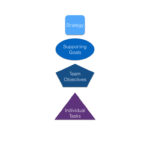by Brian Clark | change, culture, development, Employee Engagement, Performance
According to a recent study published by SHRM, 9 out of 10 line managers report that they do not like preparing for and delivering the annual performance review. 9 out 10 HR Managers report that they cannot rely on the data in the annual performance reviews. And most employees will agree that they would rather go to the dentist than go through a performance review!
What’s the point? Many people complain they see no outcomes from performance reviews. If there are no next actions then why are they conducted in the first place?
Clearly the system is broken! 
It does not have to be this way. Give your managers the learning they need to deliver effective performance reviews that will build a performance culture and improve employee engagement. Performance Reviews can be a positive experience for both managers and their people.
Introducing the Performance Management and Development Toolkit for Managers. This set of e-learning courseware will solve some of the most common performance management, performance review and development headaches. Turn the one time per year discussions into on-going discussions. Create valuable annual reviews driving development resulting in more motivated employees.
Get in touch and we can let you have a look at this suite of e-learning modules.
by Brian Clark | Business Process, capability, change, Employee Engagement, Performance, Productivity
Productivity is a hugely popular topic and there is no shortage of authors, teachers and ‘gurus’ out there to help you get more productive. You may be using Microsoft Outlook at work but if you do a search on ‘productivity apps’ you will get an avalanche of options for your laptop, phone and tablet. Productivity is a big deal and big business. It has advanced way beyond the days of sending people to a time management program and see them return with a paper planner in a binder. If you don’t remember those days you did not miss much.
Do you ever wonder why key strategic milestones and projects are not completed successfully and on time? Is your organisation slow to respond to changing internal external pressures? Are you only discovering failed or stalled projects when it is too late?
Organisational and team productivity is not always a sum of the ‘parts.’ Every person in a team may be highly productive but this does not always translate to overall productivity when measured by successfully achieving objectives. As a leader you need to take a deeper dive and build processes that will ensure productive activity achieves outcomes. 
Our process on a high level includes the following and we may go into a deeper dive in subsequent posts. In addition we have a number of tools to help teams and managers execute tasks and achieves tasks more effectively.
- Your corporate or organisation’s strategy must be clearly ‘cascaded’ to the individual level. Each person must have ‘line of sight’ from their role to the overall strategy.
- Your strategy should be broken down into goals, objectives and tasks in alignment with your structure and the strategic horizons assigned to roles and job titles in your business. This is a very simple structure.
- The most difficult phase of achieving excellence in execution is changing the way people work together and introducing systems and discipline in at least one management process. This process includes the following steps:
- Weekly team meetings with a structure set of questions coupled with accurate note taking, task creation, task assignments and follow up. The manager meets with the team every week.
- The agenda is fast and focused.
- What are you working? Is it on your work plan and/or task list?
- Is there anything or person disrupting or distracting you from achieving completion?
- The manager asks, “What can I do to ‘clear the path’ or support you in achieving your tasks?” This is recorded as well.
- The manager has one day or less to follow up with the person on actions taken.
4. The meetings are fully documented and retained. I have clients who use OneNote or Evernote to record these meetings. The information captured is excellent for use in management meetings, reporting up the organisation and for performance reviews with the manager and team members.
This can be a major change program depending upon existing systems and processes in your business and the culture you have. This type of process must be implemented at all levels of the organisation and not focused on one business unit or functional area. All managers who will be conducting the weekly team meetings must be trained in how to conduct them and record information. If a manager is away for any reason the weekly meetings must still occur.
The end in mind for this change initiative is achieving higher levels of engagement, adaptability and competitiveness. You achieve these outcomes by enabling people to work effectively to achieve your strategic objectives.
by Brian Clark | change, culture, performance management, Values
Values can be effective in sustaining a great organisational culture as well as building a new one.
Values have had their proponents and detractors and I will admit to being a bit cynical about the use of values in an organisation to drive a cultural change. I have changed my stance a bit based on some of these components to a values framework.
1. A reasonably well known company I am familiar with adopted a very democratic method to choosing a new set of values for the business. There were committees, surveys, arguments, pilots and all sorts other change elements in a process that took 3 years. No exaggeration. Some or most of your values should be reasonably obvious based on how you ‘roll’ now. Your entire culture and its norms could not possibly be all bad.
2. Values need to be part of the language of the organisation. The best models are the leadership. The modelling must be behavioural. You do not need posters on the wall with inspirational images and the values. In my experience this actually cheapens the meaning and power of the values. I think it may have something to do with those inspirational posters that spawned in offices all over the world in the 80’s and 90’s.
3. Decision making needs to be based on the values. When decisions are made they will be scrutinised by people for alignment with the values. When leaders present and discuss decisions they must frame them in the values.
4. The values must be simple and easy to understand for every member of the workforce. The language and words need to be economical and clear just like good journalism. If you have a diverse work force that includes persons with different primary languages this is even more important.
5. Repeat the values all the time in communications. It is well known that communications are heard by a few, understood by fewer and adopted by virtually none. The way that managers and leaders lift the odds is by constantly repeating the values. It will seem weird but it works. Repetition of message.
6. Build your values into team meetings, social gatherings and all other events where people are assembling in teams and groups. You can do this by communicating the purpose of these events as well as including them in the agenda.
7. Publicly recognise behaviour and performance that is aligned with and demonstrates the values of the organisation. You may choose to create an award that recognises people who demonstrate the values and make this part of your organisations tradition.
8. Performance appraisals must include the values and they should be discussed and ranked by the employee, the manager and an agreed ranking by both. You can build a great culture more quickly when values are included in performance appraisals and recognition processes. When you are looking at succession or termination decisions the values need to play a key if not primary role in the decisions.


